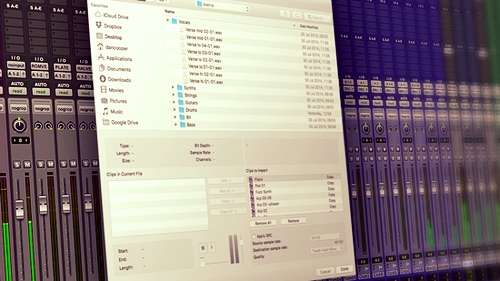I have believed for many years that Multi-instrumentists are better Music Producers and Mix Engineers than those who only play a single instrument and produce music. A musician that plays a single instrument, such as a guitar, will most likely be only familiar with that particular instrument (the guitar). A skilled multi-instrumentalist who plays several instruments to high standards have broader understandings of instrumentation including a deeper working knowledge of a variety of instrument types in performance, technique and mechanics.
I am a multi-instrumentalist myself. I'm not saying for one minute that I'm better than anyone else, God no, but I do rely heavily on all my multi-instrumental skills when I produce and mix music. My performance skills are in Piano, Guitar, Bass, Vocals and Drums - what I call the cornerstones of Music Production.
In this article, I share a handful of my own experiences that led me to believe that Multi-instrumentalists make better Music Producers & Music Mixers. If you agree or disagree with me then please do share your thoughts in the comments below. This is a genuine question from a Music Producer to the Music Production Community. Let's have a well-balanced discussion about it - Do Multi-Instrumentalists Make Better Music Producers & Mixers?
Learn An Instrument To Produce An Instrument
When I was a Music Technology student I struggled to grasp the complexities of studio drum production. I couldn't get a handle on drum recording, drum MIDI sequencing or drum mixing. At the time I was a Pianist, Bassist & Guitarist - I had no difficulty working with those instruments in the recording studio - just drums.
My Music Technology teacher suggested that it may be good for me to take some drum lessons in order for me to learn how the drums work both technically and in performance. He believed that I could crack the code if I learned how skilled drummers interact with the drums. After a few months of weekly drum lessons the fog cleared - the instrument finally made sense. I learned the basics of rhythm and fill technique which I later applied to MIDI sequencing. My MIDI drums sounded more natural and musically correct compared to my efforts before drum lessons. I learned drum shell tuning. This taught me how the drum heads alone can produce a wide variety of attitudes if tuned in certain ways. I applied those lessons to drum tracking and the quality of my drum recordings improved massively.
The biggest benefit that came from my "one-on-one" drum lessons was confidence. Confidence helped me to interact with the drums better which in turn helped me to record & produce better drums in the studio.
Instrument Favoritism In A Mix
As I stated earlier, whenever I record, produce & mix I rely heavily on my musicianship. I base my musicianship on my Piano, Guitar, Bass, Vocal & Drum performance abilities, and if I'm honest, I don't know how I could work in Music Production if I didn't have all of those skills available in my daily workflows.
I know a few synth players who produce and mix really good electronic music but when it comes to mixing vocals it sounds as though they don't understand how a singing voice should sound in a mix. Drummers who mix their own music are often brutal with their kick & snare drum levels. Similarly, guitarists often mix their parts way too loud as well - especially solos, often louder than lead vocals.
The point I'm getting at here is that I feel Multi-instrumentalists could have stronger disciplines when it comes to arranging and mixing a song. Multi-instrumentalists produce music in ways that ensure instruments in an arrangement work together which in turn creates space for instruments to fit together well in a mix.
Greg Wells, an accomplished multi-instrumentalist often writes, performs, produces and mixes his own work. You only need to listen to Mika's "Grace Kelly" to hear how he used his multi-instrumentalism to sculpt that arrangement and mix - It's a flawless production.
Sum Of The Parts
I'm a father of four. I love each of my kids equally, It's a very similar ethos I apply to Music Production. I have a personal appreciation and duty of care for each instrument in a mix because I play the core instruments that typically feature in a production. I know what a guitar should sound like because of the thousands of hours I've spent playing it, same with the piano and other instruments I've learnt over the years. In Music Production it's all about the sum of the parts, every element in an arrangement and instrumentation need to work together in musical ways to produce a song that captures a listener's imagination and emotion.
Fast Track Learning Music Production
As I write this article I am coming to a slightly different conclusion - again, agree or disagree below. Multi-instruments may not be better Music Producers or Music Mixers, maybe being a multi-instrumentalist only helps those that do know a variety of instruments to fast track skill growth in music production? Discuss...









